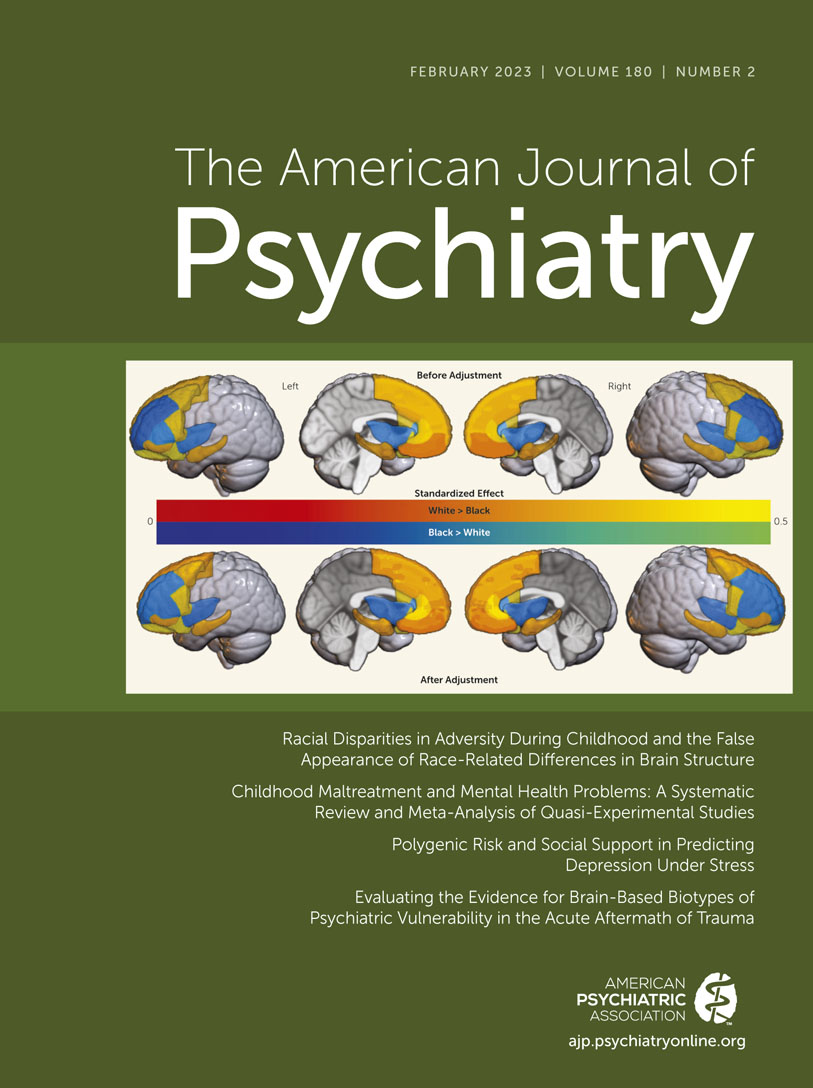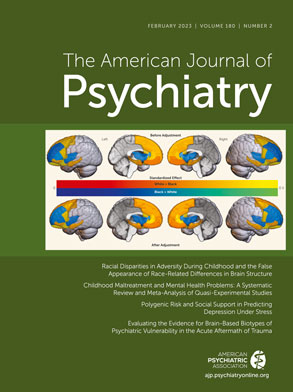Accumulating evidence supports the observed association between childhood maltreatment and mental health. Review studies and meta-analyses consistently report associations between different forms of childhood maltreatment and various forms of mental problems (
1–
7). The next question is whether this association is causal. This knowledge is crucial to inform prevention and intervention strategies. While it seems likely that mental health problems are directly caused by childhood maltreatment, other (environmental) risk factors and genetic effects can also play a role. For example, both socioeconomic disadvantage (
8,
9) and genetic predisposition—for example, in the form of higher polygenic risk scores for mental disorders (
10–
12)—have been reported to explain part of the association between childhood maltreatment and mental health.
A study in this issue by Baldwin et al. (
13) concludes that preventing childhood maltreatment could help to prevent psychopathology, but that it is also important to focus on other factors that also partly explain the association. This conclusion is based on their systematic review and meta-analysis of quasi-experimental studies examining the relationship between childhood maltreatment and mental health problems. The focus on quasi-experimental designs enabled the disentanglement of causal effects from effects from other environmental and genetic factors.
In their review, the authors included four broad categories of quasi-experimental designs: 1) family-based designs, which capitalize on varying genetic and environmental relationships between family members; 2) panel data designs with longitudinal within-individual change in exposure data; 3) natural experiments, studying effects of social or political processes, such as large-scale institutional neglect; and 4) propensity score methods, mimicking randomized experiments based on preexisting differences between exposed and nonexposed individuals.
While these approaches have been used in individual studies, they have not been combined and systematically evaluated before. Baldwin and colleagues’ systematic review and meta-analysis allowed them to examine whether studies across the various quasi-experimental methods, which all have different assumptions and sources of bias, had similar results, thereby strengthening causal inference.
The systematic search produced 34 studies with available data. These studies were based on 29 distinct cohorts comprising 54,646 participants. Before adjusting for other factors, the Cohen’s d value expressing the effect size of the association between childhood maltreatment and mental health problems was 0.56 (95% CI=0.41, 0.71). There was still a consistent association after quasi-experimental adjustment (Cohen’s d=0.31, 95% CI=0.24, 0.37). These results indicate a small causal contribution of childhood maltreatment to mental health problems. Importantly, they also show that the meta-analytic association between childhood maltreatment and mental health for quasi-experimental studies was 45% smaller than when the association was based on unadjusted analyses. This suggests that a large part of the overall relationship between childhood maltreatment and mental health is due to other (familial) environmental and genetic effects, thus providing strong evidence that approaches that do not consider this mix of factors can lead to a misinterpretation of the associations. Overestimation (and underestimation) of true casual effects could lead consequently to misguided and wasteful prevention and intervention programs.
To strengthen clinical research and clinical application of their results, the authors tested whether their reported association between childhood maltreatment and mental health was moderated by, among other factors, type of mental health outcome, type of maltreatment subtype, and measurement characteristics. The three key findings of these moderator analyses are that 1) maltreatment affects a broad range of mental health outcomes, 2) all subtypes of maltreatment were associated with mental health problems, but emotional abuse and institutional neglect showed the strongest effect, and 3) effect sizes were similar for prospectively and retrospectively assessed childhood maltreatment.
Both from a research and a clinical perspective, these findings have important implications. As indicated by the authors, the finding that childhood maltreatment causally influences a broad range of mental health outcomes could inform studies on comorbidity and underlying (biological) factors, altered brain structure and functioning, or, for example, broader emotion regulation. Furthermore, emotional abuse seems more strongly associated with mental health problems than other forms of abuse. Given that this finding is based only on three quasi-experimental studies and several non-quasi-experimental studies, however, it warrants further study. The finding that effect sizes are similar for prospectively and retrospectively assessed childhood maltreatment opens new avenues for research, where retrospectively assessed childhood maltreatment can be added to running (longitudinal) quasi-experimental study designs, such as the long-running twin-family studies around the world. This also opens avenues for immediate action to diversify childhood psychiatric research. This is essential since all studies that are included in the systematic review are based on European ancestry populations, which makes generalization to or clinical use of the results for other populations impossible.
The sharp reduction (45%) in effect size based on the quasi-experimental designs used in this study in comparison to the effect based on unadjusted studies indicates that a multitude of environmental adversities and genetic predisposition play a substantial role in the association between childhood maltreatment and mental health. The results of the study are in line with reviews that focused on genetically informed studies exploring parental risk factors for psychopathology (
14,
15). The results also indicate that the conventional multiple regression approaches overestimate the (causal) effects. This is also illustrated, for example, for the well-established association between maternal perinatal anxiety and depression with mental disorders later in childhood, where maternal pre- and postnatal anxiety were no longer associated with child internalizing or externalizing problems after adjusting for maternal depression and familial confounding (
16). Given that this trend is seen for multiple associations, it is essential to obtain valid values for the magnitude of (causal) effects. This can be achieved by adopting rigorous quasi-experimental methods to identify other potential mechanisms underlying an observed association. Family-based designs, for example, can identify whether other familial factors explain part of the association, and panel data designs with longitudinal data can indicate whether the outcome for an individual changes when the exposure changes. Triangulation, that is, investigating the underlying mechanisms of an association with different methods, is of major importance to ensure the validity of the results across methods. Extending these methods with genomic data even further enables disentangling the role of various genetic and environmental risk and protective factors to improve our understanding of the impact of parents on children and vice versa (
17).
It has become evident that the model-based hypothesis-testing science that dominated the last century should be accompanied, or preceded, by exploratory data-driven systematic triangulation approaches to generate innovative (often hidden and unexpected) hypotheses. Warrier et al. (
18), for example, performed a genome-wide association study of childhood maltreatment and explored the causality of the association with mental disorders by applying Mendelian randomization, another advanced method to explore causality. The results of these analyses suggested a unidirectional causal role of childhood maltreatment in depression. In addition, they found a causal effect of childhood maltreatment on schizophrenia and ADHD, but that effect also went the other way around—that is, schizophrenia and ADHD were also associated with an increased risk for childhood maltreatment.
As Baldwin et al. mention in their discussion, clinicians should be aware that the occurrence of childhood maltreatment is likely to be an indicator of the presence of other risk factors for mental disorders. So, in addition to trying to diminish the harmful effects of childhood maltreatment, it is also important to address these other risk factors—for example, the presence of mental disorders such as ADHD. In families with many adversities and chaos, it may seem as if treating the child’s mental disorders will not be effective. The Baldwin et al. study as well as the study by Warrier et al. suggest, however, that optimal treatment of these mental disorders could play a role in improving the outcomes for these vulnerable children. Research should further focus on identifying the other factors that explain the association between childhood maltreatment and mental disorders. In the meantime, addressing concurrent parental mental health problems and improving social disadvantage, if possible, seem sensible ways to further decrease the risk of ongoing mental health problems, as there is evidence that these are related to mental health problems too (
15,
19,
20).
Overall, the Baldwin et al. study shows that even if it seems highly likely that an association is causal, it is still utterly important to carefully explore whether, and to what extent, that is indeed the case. While childhood maltreatment has been found to have a small causal effect on mental disorders, in addition to efforts to prevent childhood maltreatment, more interventions are needed to optimize outcomes for these children.

